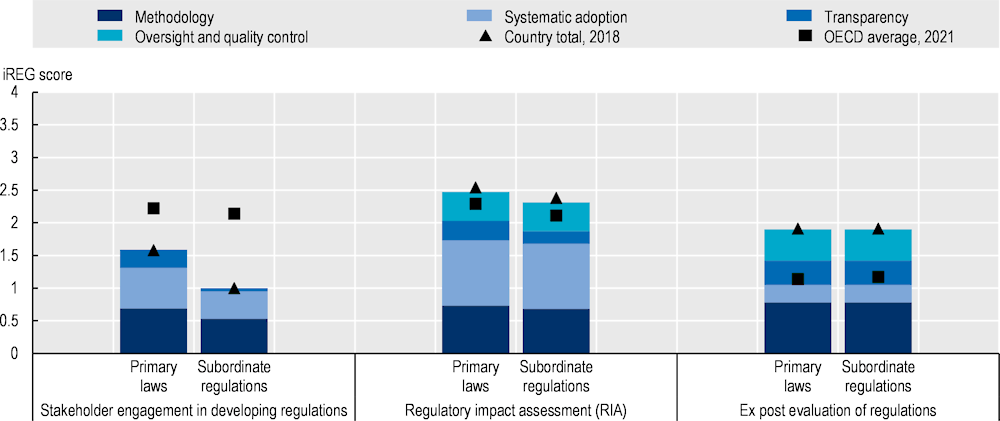In Austria, regulatory impact assessment (RIA) has been mandatory for all primary laws and subordinate regulations since 2013. A comprehensive threshold test introduced in 2015 determines whether a simplified or full RIA has to be conducted for draft regulations. A simplified RIA is carried out for about two thirds of all regulations. The methodology for a full RIA requires the assessment of a range of impacts, including on the environment, social aspects, and gender equality. The aforementioned threshold limits the requirement for ex post evaluations introduced in 2013 to regulations passing the threshold. Assessments of whether underlying policy goals have been achieved, the comparison of actual and predicted impacts, and the identification of costs, benefits and unintended consequences of regulations are part of the standard methodology for ex post evaluations. In 2019, a principle-based ex post review of 200 federal laws has been carried out with a view to reducing administrative burdens stemming from gold‑plating.
The Federal Performance Management Office (FPMO) at the Federal Ministry for Arts, Culture, Civil Service and Sport (BMKOES) reviews the quality of all full RIAs and ex post evaluations and controls and supports the application of threshold tests for RIA light. It publishes its opinions on RIAs for primary laws and can advise civil servants to revise RIAs if not up to standard. The FPMO also issues guidelines, provides training on RIA and ex post evaluation and co-ordinates these tools’ use across government. In addition, it reports annually to Parliament on RIA and ex post evaluation results. The Ministry of Finance supports the FPMO by reviewing assessments of financial impacts and costs in RIAs and ex post evaluations, and is also involved in issuing guidelines on the application of these tools.
A resolution by the Austrian Parliament triggered an extension of the scope of public consultations on draft primary laws. Since September 2017, all draft primary laws are available on the website of Parliament together with a short description of the legislative project in accessible language, the RIA and other accompanying documents. The public can submit comments on the draft regulation or support comments made by others online. Since August 2021, the public can also submit comments on all legislative initiatives introduced in Parliament, i.e. government bills, MPs’ and popular initiatives during their parliamentary deliberation and support comments made by others online. Furthermore, an interactive crowdsourcing platform has been launched in 2018 to provide the public with an opportunity to express their views ahead of parliamentary initiatives, like the extension of access to open data in 2021. Extending the use of the platform to include consultations on policy issues could be a gateway towards establishing a more systematic approach to involving stakeholders earlier in the development of regulations to inform officials about the policy problem and possible solutions. Austria would benefit from extending the scope of public consultations to subordinate regulations, for which no systematic public consultations are conducted, and from introducing systematic quality control of engagement processes.


 All/■ Always/▲ Yes
All/■ Always/▲ Yes  Major/■ Frequently
Major/■ Frequently Some/■ Sometimes
Some/■ Sometimes Never/▲ No
Never/▲ No